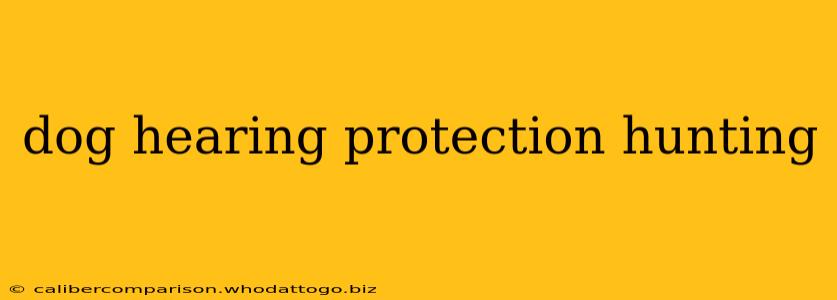Hunting can be a thrilling experience for both you and your canine companion, but the loud noises inherent in the sport can pose a significant risk to your dog's hearing. Exposure to gunfire and other loud hunting sounds can lead to Noise-Induced Hearing Loss (NIHL), a condition that can severely impact your dog's quality of life. Understanding the dangers and taking preventative measures is crucial for responsible hunting practices. This guide explores the importance of dog hearing protection for hunting and provides essential information to keep your furry friend safe.
The Dangers of Noise-Induced Hearing Loss in Hunting Dogs
Hunting dogs are frequently exposed to extremely loud noises, including gunshots, the barking of other dogs, and the calls of wildlife. These sounds can easily exceed 140 decibels, far surpassing the threshold that can cause permanent hearing damage. Unlike humans, dogs don't always exhibit obvious signs of hearing loss immediately. The damage can be gradual and cumulative, leading to a slow decline in hearing that may go unnoticed until it's advanced. Symptoms can include:
- Head shaking or tilting: Your dog might display these behaviors as a response to uncomfortable sounds.
- Changes in behavior: Increased anxiety, fear of loud noises, or difficulty following commands could indicate hearing problems.
- Difficulty responding to their name: If your dog doesn't respond when called, it could signify a hearing impairment.
- Increased sensitivity to certain sounds: Your dog might react more aggressively to quieter noises than before.
Why Dog Hearing Protection is Essential
Investing in proper hearing protection for your hunting dog is not just a good idea; it's a responsible act of care. Just as you wear ear protection while hunting, your dog deserves the same level of safeguard. Failing to protect your dog's hearing could lead to irreversible damage, affecting their ability to hunt effectively and enjoy life to the fullest. The costs associated with treating NIHL in dogs can also be substantial, highlighting the importance of preventative measures.
Types of Dog Hearing Protection
Several types of hearing protection are available for dogs, each with its own advantages and disadvantages. Choosing the right one depends on your dog's size, breed, and the specific hunting environment.
1. Custom-Fit Earplugs:
These are molded to fit your dog's ears perfectly, offering superior noise reduction and comfort. However, they often require a visit to a veterinarian or a specialist to have them made, adding to the cost.
2. Over-the-Ear Muffs:
These muffs cover the ears entirely, offering a high level of protection. They are generally more affordable than custom earplugs, but finding a well-fitting pair for your dog may require trying different sizes and brands. Ensure they are securely fastened to avoid slippage and discomfort.
3. In-Ear Plugs:
These plugs sit inside the ear canal, reducing noise exposure. They are usually more affordable than muffs but may not provide the same level of protection. It's crucial to choose soft, comfortable plugs specifically designed for dogs to avoid irritation.
Choosing the Right Hearing Protection for Your Hunting Dog
Consider the following factors when selecting hearing protection for your hunting companion:
- Comfort: Choose a product that your dog will tolerate wearing comfortably for extended periods.
- Fit: A poorly fitting product can be ineffective and even irritating.
- Noise Reduction Rating (NRR): The higher the NRR, the greater the level of noise reduction.
- Durability: Select a durable product that can withstand the rigors of hunting.
- Dog's Breed and Size: Some breeds have larger or smaller ear canals, influencing the type of protection you choose.
Beyond Hearing Protection: Other Considerations
While hearing protection is paramount, other precautions can further reduce noise exposure:
- Gradual Acclimation: Slowly introduce your dog to hunting sounds to help them adjust.
- Distance Management: Keep your dog at a safe distance from gunfire whenever possible.
- Regular Veterinary Check-ups: Schedule regular check-ups to monitor your dog's hearing health.
By prioritizing your dog's hearing health, you're ensuring their safety, well-being, and ability to continue enjoying their favorite activities. Investing in proper hearing protection is an investment in your canine companion's long-term happiness and health.

